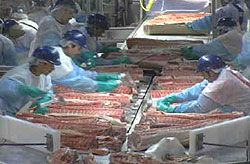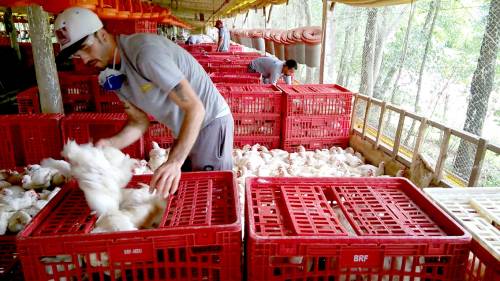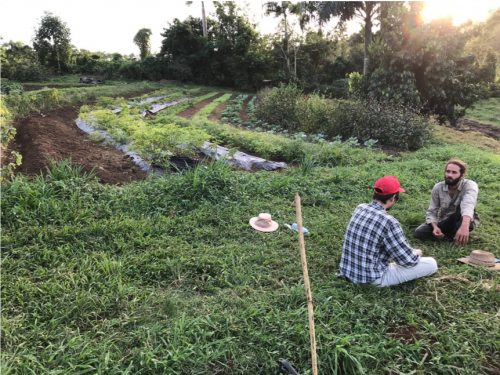*** May 7, 2020 UPDATE: Meatpacking plants have become national hot spots for the novel coronavirus. Of the 25 largest clusters of COVID-19 cases in the United States, six are tied to meat processing plants (the rest are prisons and nursing homes). At least 48 workers have died from the virus, and another 11,000 have been sickened. ***
See – Meatpacking More Dangerous Today Than a Generation Ago,
Amplifying COVID-19 Crisis
Meat is on my mind today. It may be on yours as well.

Photo credit: Civil Eats – civileats.com
TAKE ACTION BELOW
Analysts are expecting shortages of meat in groceries by next week. Yet, the president of the United States says the food supply is fine and in breaking news passed an executive order to keep meat processing plants open despite worker deaths. Union leaders are not happy about this.
Indeed, perspectives on meat are diverse:
- If you are unemployed, getting your unemployment funds may be top priority, and beans and rice might be what’s for dinner.
- If you are well off, you probably have a good assortment of animals in your freezer.
- If you work in meat processing, you are considered essential and you risk your life every day. You may feel scared and expendable.
- Or because of rampant infection, your meatpacking plant finally closed and you pray you weren’t infected.
- Or you are sick as a dog with Covid-19.
- If you are a restaurant worker in Georgia, you feel like a guinea pig as restaurants begin reopening, despite warnings from epidemiologists.
- If you are a pig producer, you are facing the prospect of having to murder your pigs – potentially 700,000 pigs per week may need to be ‘culled’.
- If you are a pig…

Photo credit: Christopher Carson, from unsplash
If you are a pig … or you work with them
The killing of pigs happens with or without the coronavirus. The United States slaughters about 2.3 million pigs every week (1). The current gridlock comes with the closing of more than one-third (36%) of hog slaughter capacity as of Monday.
Allow me to digress for a moment. On Sunday, Tyson Foods printed a full-page ad in the Washington Post. In it, they said “Millions of animals – chickens, pigs and cattle – will be depopulated because of the closures of our processing facilities.” Depopulated translates into – slaughtered anyway without being eaten. Then in the next paragraph – “We have a responsibility to feed our country. It is essential as healthcare.” When high meat consumption, especially red meat and meat raised on factory farms, has been linked to heart and other diseases, this line strikes me as bizarre at best – but, risking a rant, I’ll leave it there.
The closings of processing facilities are not isolated to pigs and include chicken and cattle plants.
 As of April 28 at 12pm ET, at least 85 meatpacking and processed food plants have confirmed cases of Covid-19, and at least 16 meatpacking plants and five processed food plants are currently closed. [map of closings] At least 4,330 workers are confirmed sick and at least 19 have died. (2)
As of April 28 at 12pm ET, at least 85 meatpacking and processed food plants have confirmed cases of Covid-19, and at least 16 meatpacking plants and five processed food plants are currently closed. [map of closings] At least 4,330 workers are confirmed sick and at least 19 have died. (2)
Workers report cases where some employers concealed Covid-19 outbreaks or refused to provide protective equipment. (2)
Even without the threat of infection and death from Covid-19, conditions in meat processing plants were already dangerous and disgusting. People of color and many immigrants, are disproportionately employed in these facilities, which illustrates the racialized nature of work in the food chain. Accidents and fatalities are very high compared to most other professions. The Centers for Disease Control and Prevention (CDC) and academic studies found the nation’s estimated 526,000 meat and poultry processing workers face hazards including tasks involving repetitive motion and prolonged standing linked to musculoskeletal disorders, exposure to chemicals and pathogens, and traumatic injuries from machines and tools. (3) Now, under cover of the coronavirus, the dangers have increased, especially as some factories get waivers and increase line speeds.
Learn about the Presbyterian Church (U.S.A.)’s position on factory farming /
Confined Animal Feeding Operations (CAFOs) here.
Connections between human encroachment, coronavirus and meat

With deforestation, the expansion of human settlements, and hunters going deeper into remote forest areas for wild animals, exposure of humans to novel pathogens has increased steadily. PHP’s Eileen Schumann covered this and related issues around deforestation in Tuesday’s post. Also, industrial agriculture worldwide has pushed small-scale farmers deeper into forests where these types of pathogens exist.
In fact, new research suggests that industrial livestock might be the origin of the coronavirus. Animals with near-identical genetics, which are confined in factory farms, can be perfect incubators due to unsanitary and cramped conditions when these pathogens spill over. When they do, viruses spread rapidly and often become more virulent as happened in the U.S. with chickens and turkeys in 2015.
 A 2019 review of the scientific literature has found that since 1940, agricultural drivers were associated with more than 25% of all — and greater than 50% of infectious diseases caused by germs that spread between animals and people. These percentages are anticipated to increase along with human population growth and the further expansion and intensification of agriculture.
A 2019 review of the scientific literature has found that since 1940, agricultural drivers were associated with more than 25% of all — and greater than 50% of infectious diseases caused by germs that spread between animals and people. These percentages are anticipated to increase along with human population growth and the further expansion and intensification of agriculture.
An incomplete list of deadly pathogens recently emerging from agriculture include H5N1-Asian Avian Influenza, H5N2, multiple Swine Flu variants (H1N1, H1N2), Ebola, Campylobacter, Nipah virus, Q fever, hepatitis E, Salmonella enteritidis, foot-and-mouth disease, and a variety of influenzas. (3)
Not only does the industrial food system increase the spread of deadly pathogens, our food system is the No. 1 driver of climate change and the primary cause of chronic diseases — diabetes, heart disease, obesity — responsible for U.S. citizens now living shorter and sicker lives. [A new song, “Food As a Machine Gun,” by Chuck D and Flavor Flav and featuring special guest, Public Enemy shows the negative impacts of our food system.]
The centrality of our food-farm system to the health of people and planet is why PHP and our partners in the U.S. and overseas emphasize the need for deep structural improvements.
If we can get food right the benefits ripple out
The food system generates an estimated 30% of global greenhouse gas emissions while also despoiling water, air, soil and ecosystems. Finding more sustainable and equitable ways to feed ourselves is a number one priority.
Kim Stephens, a member of Iowa CCI, which is a long-term PHP grantee partner, warns about the worsening impact on water from factory farms as the federal government weakens oversight by the Environmental Protection Agency (EPA). Their governor and leadership at the Department of Natural Resources “have rolled back nearly all environmental regulations, allowing factory farms to cram extra livestock into confinements and removing any penalties for environmental violations.”

Finca Josco Bravo, an agroecological farm in Puerto Rico. Jesús and Ian, members of Organización Boricuá, take a break to chat.
The Covid crisis has revealed two things very clearly. One is that our centralized, industrial food system is vulnerable and often undependable. Second, we have witnessed the adaptability and resiliency of local and smaller-scale regional food systems. Strengthening local and regional food webs that are grounded in agroecological practices and food sovereignty is a promising pathway to health for people and for the planet.
“People and Planet First” solutions
People and Planet First is borrowed from Iowa CCI, which is how they describe their approach to organizing and advocacy. Here are some ideas on how to put this concept into action when it comes to industrial livestock and food factory workers:
1) Call for Government Action
Call on our government to act to ensure sick days, healthcare, worker protections, and income for all workers. Sign the Food Chain Workers Alliance petition here.
2) Help Build Resilience
Build Resilience into our Food Systems. Resilience is the cornerstone of a sustainable food system.
The UN Food and Agriculture Organization defines resilience as “the ability to prevent disasters and crises as well as to anticipate, absorb, accommodate or recover from them in a timely, efficient and sustainable manner. This includes protecting, restoring and improving livelihood systems in the face of threats that impact agriculture, nutrition, food security and food safety.
Build resiliency by supporting nearby farmers and strengthening your food system. First and foremost, support family farmers and fishers as the foundation of our food-farm system. In addition, if you live in a city, you can be part of a surge in urban agriculture, which has been one silver lining to the crisis. Last but not least, give to the Presbyterian Hunger Program so we can assist amazing groups around the U.S. and world doing this work.
3) Promote Agroecology & Food Sovereignty
Agroecological farming is the most resilient, sustainable and equitable approach to producing food. The moment is here to move toward greater food sovereignty. As Leah Penniman, co-founder of Soul Fire Farm says, “We must feed ourselves to free ourselves.” Learn more by downloading the 2-page overview “Agroecology and Why it Matters” and on the Food & Faith Blog.
Learn More:
- UPDATE from IATP: Meat Plant Closings Show Fragility of “Get Big” System, Say Midwest Family Farm GroupsThe groups called for government pandemic response programs to:
- Prioritize access to safety net programs for farms and small food businesses.
- Prohibit loans for new or expanding Concentrated Animal Feeding Operations.
- Require fair market practices rules to allow independent livestock producers and small and mid-sized packing plants to compete on a level playing field.
- Establish a moratorium on new agribusiness and food industry mergers.
- Reinstate mandatory Country of Origin Labeling (COOL).
- New Article fromThe Hill yesterday:Bipartisan pair of senators request antitrust probe into meatpacking industry
Other Related Articles:
- Faith and your dinner plate
- Local Food Surges in U.S. during Pandemic
- Rural abundance core to justice, climate and food
- Support Farm Workers (and Undocumented Residents) During this Crisis
- How to Cool the Planet?
- Rural abundance core to justice, climate and food
The work of the Presbyterian Hunger Program is possible thanks to your gifts to One Great Hour of Sharing

Photo credit: Jed Owen, Unsplash